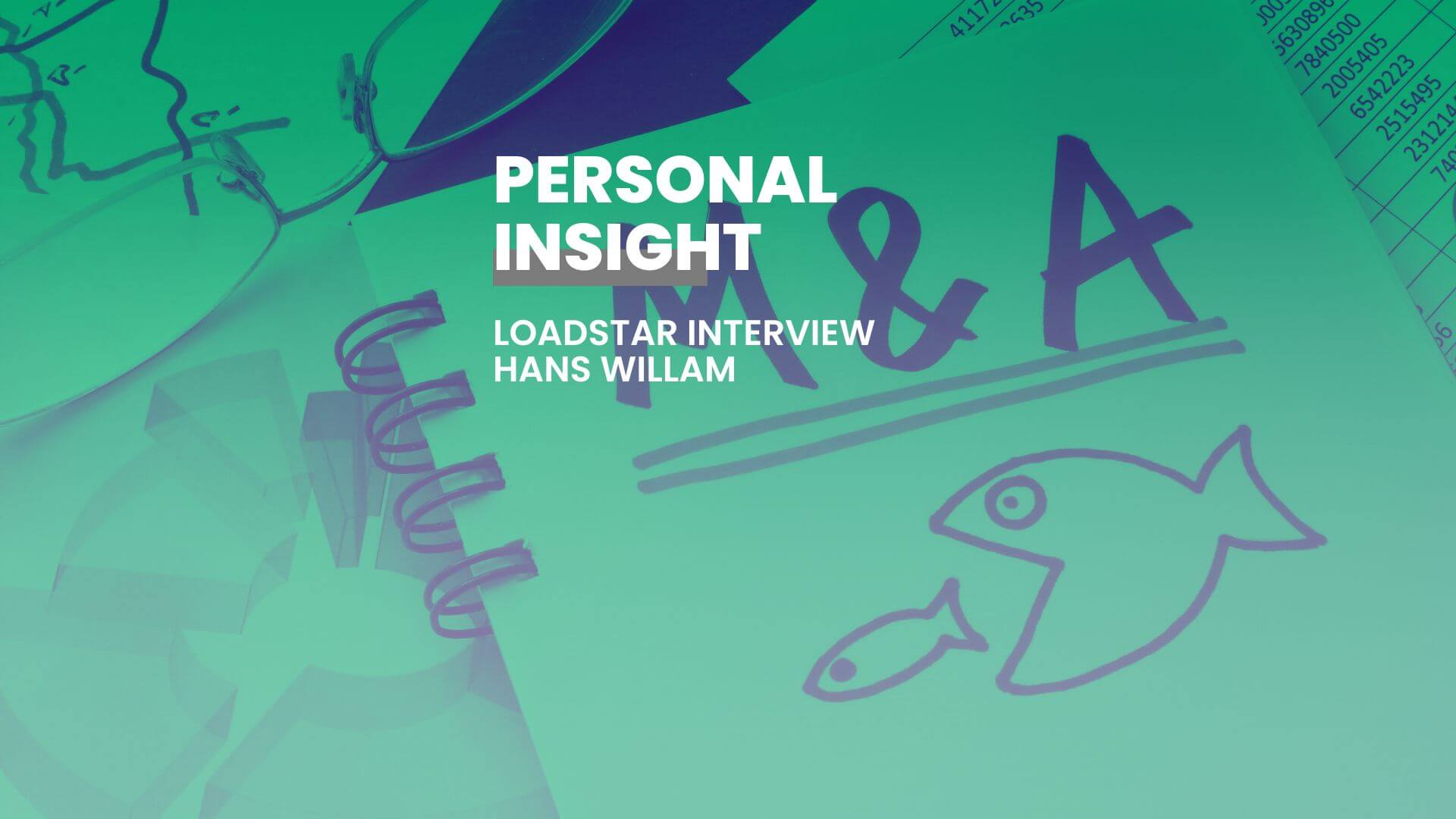BY ALESSANDRO PASETTI
Some don’t like him at all. Others just happen to love him.
“Yes.”
Either way, Hans J. Willam (pictured below) of Hamburg-based Worldwide Consultants in Logistics GmbH (WCL) – of which he has been the mastermind for a quarter of a century – frequently comes up in conversations with people that matter in transport and logistics.
Quite pertinently, I think, I still vividly recall his ‘Super-NVOCC triumvirate‘ thoughts, shared with Premium right in the middle of the pandemic. Stretching brains, he publicly challenged existing structures and the traditional thinking – Willam knowing the inner strengths and weaknesses of an industry that he loves wholeheartedly.
Neutrality
Willam’s views seldom fall on deaf ears. Instead, a sentiment gauge, his remarks usually drive the debate on strategy, market conditions for executives and, crucially, M&A.
I was grateful he agreed to talk to Premium at a time when the old paradigm concerning vertical consolidation and neutrality in the supply chain – on top of market conditions for new hires and industry dynamics – are seriously challenged.
“Already today, the number of senior candidates looking for a new job has jumped to a level we have never seen before. Based on future M&A, it will rise further across the industry, not only because of the DB Schenker sale. It started at the beginning of 2023 and the numbers have grown month by month. There will be a new peak.”
Great time to talk
Given Premium’s focus, questions as far as deal-making is concerned, are plentiful. For instance: what if DB Schenker ends up being owned by a box line?
“Mærsk is the best fit,” Willam argues.
And then: what if DSV doubles in size by taking full control of the likely last sizeable asset-light 3PL on the market?
“That will be one to watch, integration won’t be easy.”
And DHL?
To paraphrase, that’s unlikely to be the ultimate solution to… Germany’s coffers.
Also: what about Mærsk’s push in logistics as a “global integrator”? And CMA CGM’s Ceva and their plans? And the world’s largest carrier by volumes, MSC? Finally, what about the ripple effect for mid-sized forwarders? Are they at risk or is it consolidation an opportunity for them?
Let’s get going
In a comprehensive call with Willam, I gladly touched upon all these thorny aspects, drilling down on what could shape the industry for years to come.
We started with Germany* and its troubles.
(*In case you missed the catchy Bloomberg headline out earlier this month: “Germany’s days as an industrial superpower are coming to an end“.)
It’s a pivotal moment for the country.
HW: “Look at labour conflicts. We have seen them historically in many parts of Europe, France, the UK and elsewhere. But it’s very unusual for Germany. People are questioning what’s going on in our country. Political decisions carry real risk.”
And in the meantime, the logistics industry is also at a critical juncture.
HW: “The industry is changing. And it’s not the tech side of it, it’s the M&A side of it. Now DB Schenker is on the market, but with the closing of CMA CGM-Bolloré Logistics via Ceva Logistics we’ll have another major GLSP [global logistics service provider] competing on a bigger scale.
“The next five to ten years will be interesting in this respect. The big guys will grow bigger. For the small ones, there will be opportunities to react, but it will become increasingly difficult for them to protect their business.”
Focus here: mid-sized forwarding businesses, in particular, boasting between $1 billion and $2 billion in sales.
HW: “DHL Global Forwarding, Kuehne + Nagel, DB Schenker, DSV and Ceva Logistics, the top five, will all be driven by a market share perspective, putting a lot of pressure on the much smaller logistics providers in that range.”
In Europe, out of the top takeover targets often rumoured in recent years, quite a few of the them are German. What about Dachser, Hellmann and others, amongst the most prominent 3PLs?
HW: “I am not thinking Dachser, with their very strong focus on land freight, although in air and ocean Dachser ranks outside the top 10. They are strong and have recently been active in M&A. Meanwhile, Hellmann Worldwide Logistics, after the past restructurings and some help thanks to Covid, they are a lot stronger financially than they used to be.”
Geo-driven M&A? Tell me how we should think about that.
HW: “European forwarders, GLSPs are typically stronger on Asia-Europe and Transatlantic, and weaker on the Transpac trade. The opposite typically applies to North American players. I don’t think deals will be mainly driven by those considerations, i.e. in order to fill the gaps geographically.”
One key aspect concerns inorganic growth strategies. Deals, indeed. Think about CH Robinson, which is currently strained and years ago was looking at Europe for potential M&A.
HW: “But then they stopped, and it’s possible that such a strategic decision was due to new shareholders coming on board. That said, based on recent market reports, CH Robinson seems to be focusing again on M&A in Northern Europe.”
Which I personally find to be a very long shot given its finances. And past deal focus, chiefly: agents. But CH Robinson could be a target for DSV if DSV fails to acquire DB Schenker. Let’s talk about ‘DSV vs the rest‘.
HW: “The Danish forwarder would like to show that they can manage big accounts. As we know, they quote only if the [shipper] account is profitable. But what’s different compared with its direct competitors, is that the other big guys know that you can lose on one side, product, and win big as part of a broader multi-product offering. And that is likely to remain a differentiator, regardless of the new DSV organisational structure that is being implemented.”
To the hot topic now: the sale of DB Schenker.
HW: “Firstly, why is DB Schenker for sale? Politicians are focused on the passenger business, right. But please, also think when it all started. It was peak for valuations in the market, thanks to Covid, when for DB Schenker, over €20 billion in value was conceivable.”
Who can offer €15 billion or more now?
HW: “DB Schenker is losing people, and customers are questioning the Deutsche Bahn strategy.”
The most fitting buyer for DB Schenker?
HW: “Very clearly, that’s Mærsk. Because, as we all know, they have major issues with their logistics product. After acquiring DB Schenker, it would be easy to integrate Mærsk Logistics & Services into DB Schenker. But: this will not happen because it would require Mærsk to give up their strategic target, Integrated Logistics.”
Who will buy DB Schenker?
HW: “There are several companies. But let’s segregate: large GLSPs; shipping companies; and rich Mideast companies looking to become a top five GLSP.
“Firstly, I don’t think any other large GLSP, besides DSV, will be seriously interested. Apart from Mærsk, MSC could be interested. If so, all of MSC’s current logistics activities could be integrated into DB Schenker, including France’s Clasquin [currently subject to a takeover offer].
“MSC seems to like investments in Germany, think of Hamburger Hafen und Logistik. All MSC has to do is to build ‘Chinese walls’ between MSC Liner and DB Schenker in order not to endanger their relationships with the NVOCC [Non-Vessel Operating Common Carrier] clients of the liner service.
“None of the Mideast players have a large global logistics share. If the Mideast players believe in global logistics, they will become a top five player by buying DB Schenker.”
What will happen if DSV turns out to be the highest bidder?
HW: “Most probably many key employees of DB Schenker will start to look for a new job. Depending on where these key employees will end up, a number of DBS customers will look for a new GLSP to provide logistics services. And if the process, including due diligence, takes a long time, the value of DBS in 2025 will be much lower.”
For a moment let’s move away from the sale of century – carriers: how are things for them?
HW: “If it wasn’t for the Houthi rebels, their past few weeks would have been a lot more tense. The rates war has been delayed, but negative Ebit is reality now as we saw with Mærsk the past week.”
What will happen to the Logistics & Services division of Mærsk if they don’t buy DB Schenker?
HW: “I saw their 2023 figures and we don’t even know how accurate those numbers are. You need to keep in mind that there are large allocations (sales, finance, IT etc etc) and it is very difficult to find the accurate allocation key/percentage. Anyway, considering that APMM has 80%+ executive board members (16) not coming from freight forwarding/supply chain management solutions, you have to question how Mærsk will make money long term. I don’t believe in the ‘one-stop shop’ concept and, to my knowledge, many BCOs [Beneficial Cargo Owners] share my opinion. I have always said that it was a mistake to integrate Damco into Maersk.”
It’s 50 years for you in logistics in 2024. And the 25th anniversary of your company, Worldwide Consultants in Logistics. What’s next?
HW: “I am now a supporter of the two shareholders of WCL, where I retain the title of senior advisor, with Christian Nebel and Martin Sieg now owning 50% each in the company. I think I am leaving WCL to two gentlemen and market professionals who can successfully drive it forward. The focus of WCL will continue to be executive search/recruitment, M&A and consulting, including NVOCC structures.”
Thanks to the courtesy of Loadstar, WCL has been authorized to publish the full article even though it is paid content.

